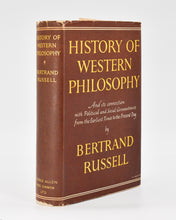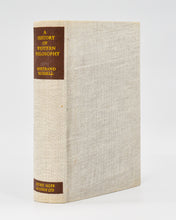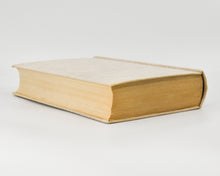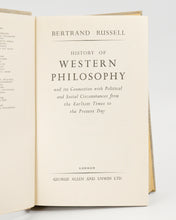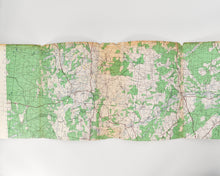
Wrapped in a WW2 map of the German-Polish border
RUSSELL, Bertrand. History of Western Philosophy: And its Connection with Political and Social Circumstances from the Earliest Times to the Present Day London: George Allen and Unwin Ltd. 1946.
Original grey cloth, lettered in yellow to a brown ground, in the dustwrapper; pp. 916; an uncommonly fresh copy, the cloth and lettering bright and sharp; offsetting to endpapers, with a contemporary ownership name “K Davies, London 1947” to the upper edge of the front free endpaper; the dustwrapper with a few nicks and short closed tears to spine tips, is otherwise bright and clean. A near fine copy.
First UK edition, first printing, a revision of the first US edition issued the previous year. Produced in conformity with war economy standards, the edition is notable for its repurposing of surplus wartime maps for the dustwrappers; this copy, hauntingly, showing a cross-section of Germany and Poland to its verso side.
Russell's magisterial survey begins in ancient Greece and ends with work being done at the time he was writing the book. Published immediately after the war, the book has never been out of print. Deriving from a series of lectures Russell delivered in Philadelphia during the war, and the book, in its placing of philosophers and their work in their historical and cultural contexts, was intended by the author as a defence of the values at stake during the war itself, presenting each thinker as a crystallisation “of thoughts and feelings which, however vague and diffused, were common to the community of which he [and it is always he in the book] was a part” (from the jacket).
The first edition is, appropriately, printed in conformity with war economy standards, and famously repurposes surplus wartime maps for the dustwrappers, this copy showing a cross-section of Germany and Poland, including the towns of Międzychód (German: Birnbaum), where most of the Polish residents were expelled as part of the “Heim ins Reich” program pursued by Hitler before and during the war, and Trzciel (German: Tirschtiegel), home to an extended Jewish community from the eighteenth century until the events of the mid-twentieth century, when the population dropped markedly. November 9, 1938, saw a Pogrom in Trzciel during which “rioters torched the synagogue and demolished the town’s last Jewish owned house.” During the war, the Germans established a forced labour camp for Jews in the town. In 1945, Trzciel was captured by the Soviets. Eventually the town was restored to Poland and the remaining German population expelled.
The Jewish Community of Trzciel (website of The Museum of the Jewish People). Blackwell & Ruja A79.2a.
#2121539





